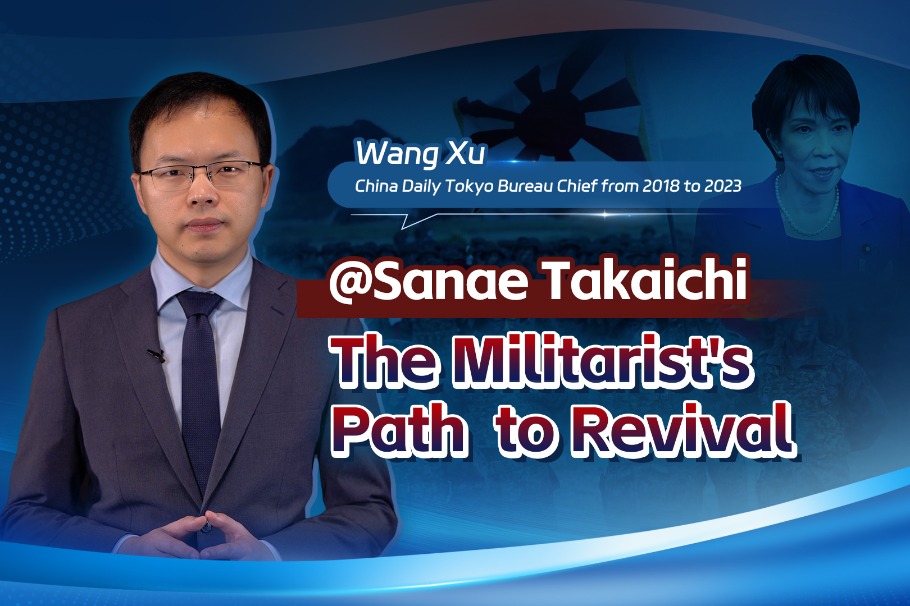Ishiba faces tough test trying to reconcile contradictory agenda

Beijing is firmly opposed to Washington cobbling together exclusionary and confrontational groupings and abusing the concept of national security to undermine China's normal trade and economic cooperation, not only with the United States but also with other countries.
As a Chinese Foreign Ministry spokeswoman stressed once again last week, such behavior is not conducive to maintaining the stability of the global industry and supply chains, and does no country any good. She called on the US "to right its wrong and provide a fair, just and nondiscriminatory environment for Chinese companies".
Therefore, it's not surprising that just two weeks after taking office Japanese Prime Minister Shigeru Ishiba's political agenda is inherently contradictory. He wants to rebalance the alliance with the US to increase Japan's strategic autonomy and foster "constructive, stable" relations with neighboring China through dialogue and cooperation. Yet at the same time, he wants to pursue an "Asian version of NATO".
The Japanese leader is not helped in trying to reconcile his more-or-less conflicting goals by Washington being so set on weaponizing its alliance with Tokyo to serve its own strategic competition with Beijing.
Washington is determined to confront Beijing, not only with an all-of-government approach at home, but, more importantly, also with all the US' allies and partners on board. From Washington's perspective, it is with us or against us.
Despite a decent, productive China-US relationship being in no way exclusive of a closer US-Japan alliance, Washington won't allow Japan to have it both ways.
That message was bluntly explicit in the Oct 15 letter from the top Republicans and Democrats on the US House China Select Committee to Japanese ambassador to the US. In that letter, Committee Republican Chairman John Moolenaar and top Democrat Raja Krishnamoorthi urged Japan to align with the US on imposing further restrictions on sales of chipmaking equipment to China. In addition to the previous emphasis on cutting-edge chips and equipment, they asked Tokyo to extend present restrictions to undermine China's capacity to make less-advanced chips. Failing to do that may subject Japanese companies to US restrictions, or have them denied access to US semiconductor subsidies. And they threatened that the US could invoke its "foreign direct product rule" to regulate goods made overseas that contain even the tiniest amount of US technology.
Despite its allies' reluctance to make such self-damaging moves before next month's presidential election in the US, the Joe Biden administration is clearly determined to announce complementary export control regimes to close loopholes in the existing ones. Compared with Washington's strategic need, which has been raised to the level of national and international security, the economic interests of its allies are clearly of no concern to the US. The US lawmakers, for instance, have ignored Japanese concerns about such restrictions hurting domestic companies, claiming they "do not appear to stand up to scrutiny".
But there is no denying the fact that China has been the biggest and most lucrative market for all the chip and chipmaking equipment vendors in the world. Not to mention Tokyo's legitimate concerns that ruining ties with China may affect its supply of critical materials.
That Tokyo's desire for strategic autonomy is at odds with Washington's endeavor to counter China is also undeniable. Washington has made it crystal clear that it considers its allies' interests expendable in its efforts to contain China.
Japan, as an industry leader in the global semiconductor sector, will be the first for the US to enlist in its geopolitical considerations, as Deputy US Secretary of State Kurt Campbell indicated at a recent Center for Strategic and International Studies event. "Supply-chain support integration between the United States and Japan is essential," he said.
The Chinese Foreign Ministry has made it clear that Beijing regards Washington's efforts to form exclusionary groupings as confrontational. So to what extent the supply-chain support integration the US is demanding of Japan compromises Ishiba's stated desire to improve Japan's relations with its neighbor will be a test for him and his Cabinet.
Today's Top News
- Chinese FM urges Japan to reflect on, correct mistakes as soon as possible
- China hails 'hard-won' COP30 Global Mutirao decision
- Chinese premier urges G20 to uphold free trade, build open world economy
- China, US hold maritime safety talks in Hawaii as Beijing reiterates warnings on sovereignty
- China sends letter to UN over Japanese PM's remarks on Taiwan
- Chinese, Uzbek FMs hold second strategic dialogue






























